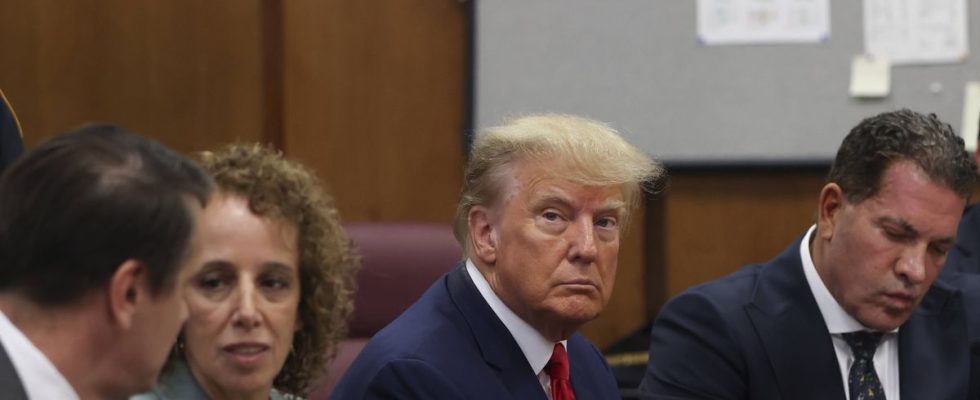From our correspondent in the United States,
Entering the Manhattan courtroom at midday, Donald Trump looked gloomy. Formally charged with 34 charges of falsifying financial documents, the former US president, who pleaded not guilty, is accused by the Manhattan prosecutor of having wanted to conceal embarrassing affairs from voters, in particular a supposed affair with the ex -porn actress Stormy Daniels. But in front of the cameras, Tuesday evening, at his home, in Mar-a-Lago, the former American president was reassembled. According to him, “everyone who has looked at this file, including the Democrats, says that there is no crime”. Hyperbole with a grain of truth: Many experts believe that prosecutor Alvin Bragg may have forced his hand with charges usually considered mere offenses, which he has raised to the level of misdemeanors punishable by imprisonment. “It’s a risky strategy”, says the lawyer specializing in national security issues Brad Moss.
What is Donald Trump accused of?
The indictment includes 34 charges of financial “falsification of documents”. The number seems high, but there is one count for each of the eleven checks Donald Trump wrote to his ex-lawyer Michael Cohen to pay him off. The latter had paid $ 130,000 to Stormy Daniels to buy her silence before the 2016 presidential election, when she was about to claim in the media that she had had an affair with the real estate magnate ten years earlier. The other charges relate to Trump Organization accounts, with reimbursements reported as legal fees.
What is the link with the election?
In the statement of facts, Donald Trump is accused of having “fraudulently and repeatedly falsified” these documents “to conceal criminal conduct by withholding damaging information from the public” during the 2016 election. According to the prosecutor, the Republican candidate sought to cover up three embarrassing cases. Stormy Daniels, therefore, but not only. In June 2016, the boss of the National Enquirer, David Pecker – a close friend of Trump – bought for $ 150,000 the exclusive testimony of ex-playmate Karen McDougal, also for an alleged affair. But he never published it, a practice known in the tabloid world as “catch and kill.” Ditto for a doorman at Trump Tower, who said in 2015 that he had proof of the existence of a hidden child of the New York billionaire, and who received $ 30,000 when the candidate was engaged in the Republican primary.
The prosecution has an audio recording in which Donald Trump and Michael Cohen discuss reimbursing the publisher of the National Enquirer, American Media, for payment to Karen McDougal. The payback never happened, but Donald Trump invited Pecker to his inauguration and “thanked” him for clearing the two cases, the prosecutor claims. David Pecker was heard twice by the grand jury which indicted Trump and could be one of the prosecution witnesses, along with Michael Cohen.
What are the weaknesses of the case?
Accounting fraud is normally considered by New York courts as a “misdemeanor”, an offense punishable by a fine. But prosecutor Alvin Bragg has retained charges of “felony”, an offense punishable by four years in prison. For this, he must prove that by falsifying the nature of the reimbursements to Michael Cohen, Donald Trump had “the intention to commit or conceal a crime”.
What crime? This is where the matter gets complicated. The indictment or the statement of facts do not explain it. In a press conference, Alvin Bragg explained that it was not necessary at this stage of the proceedings. He raised possible violations of federal and New York state campaign finance law. Problem: Federal justice has never charged Donald Trump, and there is a “pre-emption” rule that could invalidate charges brought by the New York State Attorney against a candidate in a federal election, believes on Slate constitutional law professor Rick Hasen.
“For me, it’s a matter of offense and not misdemeanor,” abounds Brad Moss. “The prosecutor painted a fairly clear conspiracy to conceal election-related information via payments disguised as forgery.” But to have increased the charges, potentially based on federal campaign finance law is, according to the lawyer, “unprecedented”.
What can we expect next?
Prosecutors must release their case within 65 days, and Trump’s attorneys have until Aug. 8 to file their motions — they’re likely to ask for the case to be dropped or charges reduced. Prosecutors will have until September 19 to respond, and Judge Merchan will rule on December 4, according to the tentative schedule released Tuesday. The magistrate mentioned a potential trial from January 2024, which could therefore weigh on the Republican primary. According to Brad Moss, the “pre-trial” motions challenging the indictment represent Donald Trump’s best chance of winning. “That’s how criminal lawyers make their money. If it goes to trial, Donald Trump is probably screwed.
What would happen if Trump were sentenced to prison and elected in 2024?
The experts are unanimous: this charge is undoubtedly the least dangerous for Donald Trump. The former president is also threatened by federal justice investigations for his role in the assault on the Capitol or his management of the White House archives. And a decision by the Georgia court on pressure exerted on electoral officials could fall soon. If Donald Trump were sentenced to prison in New York or Georgia and won the 2024 presidential election, the Justice Department would not have the authority to seek his release. It would probably be up to Congress to impeach him through impeachment. Brad Moss concludes: “We would enter constitutional waters as crazy as they are frightening”.

